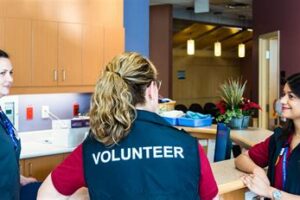Table of Contents
Are you interested in making a difference in the lives of others? Become a hospital clinic volunteer and contribute to the well-being of patients in need. Gain valuable experience in a medical setting while providing assistance and support to healthcare professionals. Join our team and make a positive impact on the community!
Are you looking to make a difference in people’s lives? Do you have a passion for healthcare and a desire to give back to your community? If so, then becoming a Hospital Clinic Volunteer might be the perfect opportunity for you. By dedicating your time and skills to help those in need, you can gain valuable experience in the medical field while making a positive impact on the lives of patients. Whether you’re interested in shadowing doctors, assisting nurses, or providing comfort to patients, there are numerous ways to contribute and grow as a volunteer. So, why wait? Join us today and embark on a rewarding journey towards selflessness and personal growth.
Introduction
Volunteering at a hospital clinic is an admirable act of selflessness that can make a significant impact on the lives of patients and their families. Hospital clinic volunteers play a vital role in providing support, comfort, and assistance to those in need. Their dedication and compassion contribute to the overall well-being of the healthcare system. In this article, we will explore the responsibilities, benefits, and challenges of being a hospital clinic volunteer.
The Role of a Hospital Clinic Volunteer
Hospital clinic volunteers fulfill various roles depending on the needs of the facility. They may assist with administrative tasks such as answering phone calls, scheduling appointments, and filing paperwork. Additionally, they may provide emotional support to patients and their families, offering a comforting presence during difficult times. Some volunteers also help with non-medical tasks like delivering meals or transporting patients within the hospital.
Benefits for Volunteers
The act of volunteering has numerous benefits for those who choose to dedicate their time to a hospital clinic. Firstly, it provides a sense of fulfillment and purpose, knowing that their efforts are making a positive impact on the lives of others. Volunteering also offers opportunities for personal growth, allowing individuals to develop new skills and gain valuable experience in a healthcare setting. Moreover, it allows volunteers to connect with like-minded individuals and build a strong support network within the hospital community.
Requirements and Training
Becoming a hospital clinic volunteer typically involves meeting certain requirements and completing a training program. These requirements may include a minimum age limit, background checks, and immunization records to ensure the safety of both patients and volunteers. Training programs aim to equip volunteers with the necessary knowledge and skills to carry out their duties effectively. This may involve learning about patient privacy, infection control, and proper communication techniques.
Challenges Faced by Hospital Clinic Volunteers
While volunteering at a hospital clinic can be rewarding, it also presents unique challenges. Dealing with patients who are in pain or distress can be emotionally taxing, requiring volunteers to develop strong coping mechanisms. Additionally, hospital environments can be fast-paced and demanding, requiring volunteers to adapt quickly to changing situations. It is important for volunteers to prioritize self-care and seek support when needed to maintain their well-being.
Impact on Patients and their Families
The presence of hospital clinic volunteers has a profound impact on patients and their loved ones. Volunteers provide a listening ear, offer reassurance, and create a sense of companionship during times of vulnerability. Their friendly smiles and kind gestures can brighten someone’s day and provide a much-needed distraction from the stresses of medical treatments. The support and empathy shown by volunteers can significantly improve the overall patient experience.
Community Engagement
Hospital clinic volunteers play a crucial role in fostering community engagement and strengthening the bond between healthcare facilities and the local population. By actively participating in outreach programs, health fairs, and educational initiatives, volunteers help raise awareness about healthcare issues and promote preventative measures. Their involvement encourages community members to become proactive in managing their health and seeking early medical intervention.
Recognition and Appreciation
The dedication and commitment of hospital clinic volunteers deserve recognition and appreciation. Many healthcare facilities hold annual events or award ceremonies to acknowledge the invaluable contributions made by these individuals. Recognizing volunteers not only boosts their morale but also inspires others to join in this noble cause. Publicly appreciating their efforts helps create a culture of gratitude and encourages more people to get involved in volunteer work.
How to Become a Hospital Clinic Volunteer
If you are interested in becoming a hospital clinic volunteer, the first step is to research local healthcare facilities and their volunteer programs. Contact the volunteer services department or visit their website to learn about the application process and any specific requirements. Once accepted, you will undergo training and orientation before starting your volunteer duties. Remember, volunteering is a commitment, so be sure to choose a schedule that is manageable for you.
The Gift of Time and Compassion
At its core, being a hospital clinic volunteer is about giving the gift of time and compassion. The impact of even the smallest gestures can be immeasurable in the lives of patients and their families. By offering support, empathy, and assistance, volunteers contribute to creating a healing environment within hospitals. Their presence brings comfort and hope, making a difference in the lives of those who need it most.
The Importance of Hospital Clinic Volunteers
Hospital clinic volunteers play a crucial role in supporting healthcare providers and contributing to the overall well-being of patients. Their selfless commitment to serving others helps bridge the gap between medical staff and families, providing comfort, assistance, and a sense of community within the hospital setting.
Assisting Patients with Care and Comfort
Volunteers at hospital clinics dedicate their time to ensuring patients receive the care and comfort they need during their stay. They offer companionship, help with daily tasks such as meal assistance, and provide emotional support to patients and their families. By doing so, these volunteers create a more positive and nurturing environment within the hospital.
Supporting Medical Staff and Streamlining Processes
Hospital clinic volunteers greatly contribute to the efficient functioning of medical facilities by assisting medical staff and administrative personnel. They help with patient intake, paperwork, and logistical tasks, which allows the medical team to focus on providing quality care. These volunteers are invaluable in maintaining a smooth workflow and reducing the burden on healthcare providers.
Enhancing the Patient Experience
Hospital clinic volunteers strive to enhance the overall patient experience by offering a compassionate and empathetic presence. Through engaging in conversations, providing comfort items, and being a friendly face in stressful situations, volunteers help alleviate anxiety and create a more positive environment for patients, ultimately contributing to their overall well-being and recovery.
Promoting Community Engagement
Volunteering at hospital clinics provides an avenue for individuals within the community to actively participate and give back. By getting involved, volunteers develop a sense of belonging and connection to their local healthcare facilities. Through their service, they also inspire others to contribute their time and resources, fostering a culture of compassion and philanthropy within the community.
Training and Professional Development Opportunities
Hospital clinic volunteering offers individuals a chance to gain valuable skills and insights into the healthcare industry. Volunteers often receive comprehensive training in areas such as patient care, communication techniques, and administrative tasks, thus allowing them to enhance their professional development and potentially pursue future career paths in healthcare.
Emotional Fulfillment and Personal Growth
The act of volunteering at hospital clinics can be deeply rewarding both emotionally and personally. Interacting with patients, witnessing their strength and resilience, and having a direct impact on their well-being can create a profound sense of fulfillment. Additionally, volunteers often develop empathy, communication, and problem-solving skills that can be applied to various areas of their lives.
Establishing Lifelong Connections
Volunteering at hospital clinics allows individuals to forge meaningful relationships with both patients and fellow volunteers. These connections can be a source of support, motivation, and friendship, contributing to an extended sense of community and solidarity among those involved in the hospital clinic volunteering program.
Hospital Clinic Volunteer
1. Introduction:
Hospital clinics heavily rely on dedicated volunteers who selflessly offer their time and skills to assist in various aspects of patient care. These individuals play a crucial role in supporting medical staff, ensuring smooth operations, and providing comfort to patients and their families.
2. Commitment to Service:
- Hospital clinic volunteers exhibit an unwavering commitment to serving others. They willingly give their time and energy to assist healthcare professionals in delivering high-quality care to patients.
- These volunteers understand the importance of their role in enhancing the overall patient experience. They strive to create a warm and welcoming environment, offering support and compassion to those in need.
- Their dedication is evident through their consistent presence and willingness to go the extra mile, even during challenging circumstances. Whether it’s sitting with a lonely patient or assisting with administrative tasks, they perform their duties with enthusiasm and professionalism.
3. Varied Responsibilities:
- Hospital clinic volunteers take on a diverse range of responsibilities, depending on their skills and the needs of the facility. They may assist in reception areas, guiding patients and visitors, answering phone calls, and scheduling appointments.
- Additionally, these volunteers may provide support in patient care areas, such as helping with mobility, transporting patients between departments, or ensuring rooms are clean and well-stocked.
- Some volunteers may even lend their expertise in specialized areas, such as playing music for patients, organizing therapeutic activities, or providing companionship to those in palliative care.
4. Impact on Patients:
- Hospital clinic volunteers have a profound impact on the lives of patients. Their presence alone can bring comfort and reassurance to individuals who may be feeling anxious or vulnerable.
- By offering a listening ear and genuine empathy, volunteers contribute to the emotional well-being of patients. They provide a sense of companionship, helping to alleviate feelings of loneliness during hospital stays.
- Moreover, these volunteers often act as liaisons between patients and medical staff, ensuring that concerns are addressed promptly and effectively. This enhances communication and fosters a sense of trust within the healthcare environment.
5. Personal Growth and Rewards:
- Volunteering at a hospital clinic offers numerous personal growth opportunities. It allows individuals to develop valuable skills in communication, empathy, and teamwork, which are transferable to various aspects of life.
- Additionally, volunteers often form meaningful connections with patients, families, and healthcare professionals. These relationships can be incredibly rewarding, further motivating volunteers to continue their service and make a positive impact on others’ lives.
- The satisfaction derived from knowing that one has made a difference in someone’s life is a powerful motivator for hospital clinic volunteers. It reinforces their commitment to service and inspires them to continue contributing their time and skills for the betterment of their community.
In conclusion, hospital clinic volunteers are indispensable assets to healthcare facilities. Their selflessness, dedication, and diverse skill sets contribute to the overall well-being of patients and enhance the quality of care provided. Through their compassionate service, they leave a lasting impact on both the individuals they assist and the healthcare community as a whole.
Thank you for taking the time to visit our blog and learn about the invaluable role of hospital clinic volunteers. Through this article, we hope to have shed light on the selfless efforts of these individuals who dedicate their time and energy to supporting patients and healthcare professionals alike. Their commitment to making a difference in the lives of others is truly inspiring.
Firstly, we discussed the various responsibilities undertaken by hospital clinic volunteers. From assisting with administrative tasks to providing emotional support to patients and their families, these individuals play a crucial role in ensuring the smooth operation of healthcare facilities. By helping with paperwork, organizing medical records, and guiding patients through the registration process, volunteers help alleviate the burden on healthcare professionals, allowing them to focus on providing high-quality care.
In addition to these administrative tasks, hospital clinic volunteers also provide much-needed emotional support. They offer a friendly face, a listening ear, and a comforting presence to patients during what can be a stressful and overwhelming time. Whether it’s engaging in conversation, reading to patients, or simply offering a smile, volunteers bring a sense of warmth and compassion to the hospital environment. Their presence not only helps patients feel more at ease but also contributes to their overall well-being and healing process.
Lastly, we explored the personal benefits that volunteering at a hospital clinic can bring. For volunteers, this experience offers an opportunity for personal growth, skill development, and a deeper understanding of the healthcare industry. It allows individuals to connect with a diverse range of people, develop empathy and compassion, and gain valuable insights into the challenges and triumphs of those seeking medical care. Volunteering in a hospital clinic can be a transformative experience that not only benefits the community but also enriches the lives of those who give their time and energy.
In conclusion, hospital clinic volunteers are unsung heroes whose contributions often go unnoticed. They are the backbone of healthcare facilities, providing essential support to both patients and medical professionals. Their dedication, compassion, and selflessness deserve recognition and appreciation. We hope this article has shed light on the vital role of hospital clinic volunteers and inspired you to consider giving back in your own community.
.
People Also Ask About Hospital Clinic Volunteer:
Why should I consider volunteering at a hospital clinic?
Volunteering at a hospital clinic is a great way to give back to your community and make a positive impact on the lives of patients. It allows you to gain valuable experience in a healthcare setting, develop essential skills, and explore potential career paths. Additionally, volunteering can provide a sense of fulfillment and satisfaction by helping those in need.
What are the requirements to become a hospital clinic volunteer?
The specific requirements to become a hospital clinic volunteer may vary depending on the organization or facility. Generally, you will need to be at least 18 years old, complete an application process, undergo a background check, and attend any necessary training sessions or orientations. Some hospitals may also require specific immunizations or health screenings to ensure the safety of both volunteers and patients.
What kind of tasks do hospital clinic volunteers typically perform?
Hospital clinic volunteers often assist with a variety of tasks, depending on their skills and the needs of the facility. These may include welcoming and directing patients, providing comfort and emotional support, accompanying patients during procedures or appointments, assisting with administrative duties such as filing or data entry, delivering flowers or mail, and helping with fundraising events or community outreach programs.
How much time commitment is required for hospital clinic volunteering?
The time commitment for hospital clinic volunteering can vary. Some organizations may require volunteers to commit to a certain number of hours per week, while others offer more flexible schedules. It is important to discuss your availability and preferences with the volunteer coordinator to find a suitable arrangement. Keep in mind that volunteering may involve occasional evening, weekend, or holiday shifts, depending on the needs of the clinic.
What benefits can I expect from volunteering at a hospital clinic?
Volunteering at a hospital clinic can provide numerous benefits. It offers an opportunity to develop new skills, such as effective communication, empathy, and teamwork. You can also gain firsthand experience in a healthcare environment, which may be valuable for future educational or career pursuits. Furthermore, volunteering allows you to make meaningful connections with healthcare professionals, fellow volunteers, and patients, fostering personal growth, compassion, and a sense of community.






